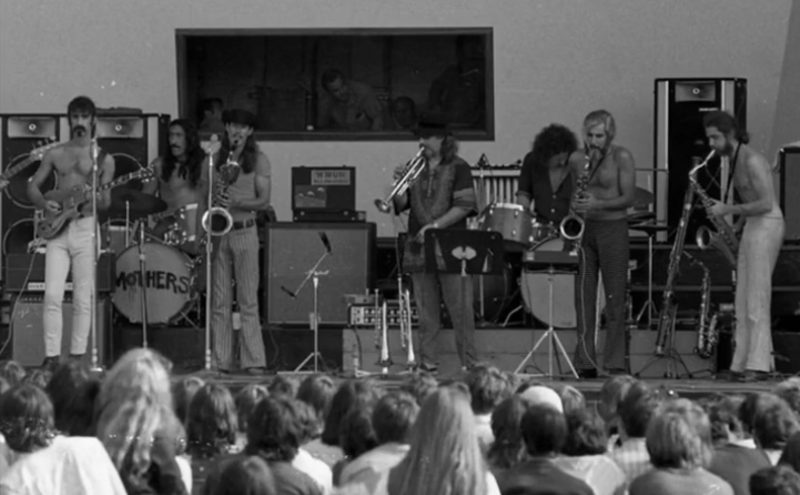Ned Garthe Explosion’s highly experimental music, and the artistic concepts surrounding it, began with a realization that the cops weren’t paying attention, which allowed the bandmembers to get away with whatever they wanted.
“Stuart [Confer] and I used to live in this house by Fort Logan mental hospital,” guitarist and singer Ned Garthe remembers. “We would watch people having full psychological breakdowns. I always wondered how we were allowed to go back and look at them. We went out there one day, and this guy was kicking a dog. Everyone was freaking out, so I called the cops. I called the Denver Police Department and they told me I was in Sheridan, so they transferred me there, and then Sheridan transferred me to Englewood Police, and then they transferred me back to Denver. It was like one block of town where the cops would not show up. I think that’s why we got away with so much crap. Thank God music was our vice.”
Garthe and Confer, along with bassist Tyler Breuer and guitarist Spencer Alred, will release Ned Garthe Explosion’s third full-length album, Flashlight Tan, on Saturday, October 8, at the hi-dive. The songwriting, themes and production are all results of unchecked experimentation, practice and uninterrupted creative thought. NGX has long been adept at turning acute observations and simple song structures into high-level musical innovations. These innovations include writing concept albums, adhering to the theory that records should be made independently, and exploring “genre play” — writing deliberately toward a certain genre, in an earnest near-parody that’s so good you can’t tell it’s a parody. It’s a depth of vision that can only be achieved late at night, when the cops are nowhere to be found.
“We had this unabashed open studio for a while where we could do anything,” Garthe says. “I didn’t have a real job, and we would just play music all night. I’d get off work at 3 p.m., and from 4 p.m. to 2:30 a.m., Stuart and I would just play music.”
“We thought we were lucky to be able to play music all night, but it turns out the neighbors were hearing us and were pissed the whole time,” drummer Confer says.
Although Garthe now seems to have no problem focusing on his craft, his involvement in music began as a way to stay out of trouble.
“I was a really crappy little kid in elementary school, and I kept getting in trouble,” Garthe remembers. “I couldn’t keep it together in school, and I had to sit next to the teacher, and I had to have conferences constantly about my behavior. I was just the worst kid.”
As a way to bridle his son’s less-than-stellar behavior, Garthe’s dad worked out a deal that every time Garthe got a good report from his teacher, he would give him a dollar toward a $200 Squire guitar. If Garthe got to $100, his dad would match the rest.
“I thought that was impossible and there was no way I could be good for 100 days,” Garthe says. “When I started to do better, my dad started throwing in an extra $5 here and there. I got that electric guitar, and that was it. I got it, and then I realized I didn’t even have an amp, so I plugged it into my parents’ record player and started playing.”
While music and the craft of learning to play guitar calmed Garthe and got him through elementary and high school, it didn’t exactly take all the fire out of him. That much was clear when Confer first made his acquaintance.
“I showed up at this party with my friend Ryan in Wash Park, and Ned was in a tree,” Confer says. “He was wearing an American flag for a headband, and later he started throwing machetes up in the air. For some reason, I thought, ‘Okay, this is a guy I can hang out with.’”
Confer, who was fronting the established band Hindershot at the time, saw a kindred spirit in Garthe, and the two immediately started on their creative path together.
“We started writing a soundtrack for this play called Alice in Harlem Land,” Confer says. “We immediately knew that we were synching up and that we worked really well together. We did a full score — I still think it’s awesome. It was a masterpiece!”
While projects like this one would set the tone for the high-level concepts the two would tackle in the future, Confer’s main focus at the time was still Hindershot. When the bass-player position in that band opened up, Confer asked Garthe if he would be interested. It didn’t exactly work out.
“I asked Ned to be in Hindershot, and he called me the first day of practice and said he couldn’t come because he was too drunk. I told him he was out of the band before he was really in it,” Confer says.
Although Garthe’s initial tenure in Hindershot was short-lived (he would eventually join the band full-time), he and Confer continued to play music together, starting a band called Pit Viper. Early in the band’s formation, they called longtime friend and Hindershot guitarist Alred, who was booking the Skylark at the time, to set up a show.
“They called me and told me the name of the band, and I repeated ‘Tit Viper’ back, and they said it was right,” Alred recalls. “So we put ‘Tit Viper’ on the marquee, and they said they liked the name better.”
A mistake like that might upset a lot of bands. But for Confer and Garthe, the comedy around the error was the type of humor they truly reveled in. It was bizarre and abstract, an inside joke that only they could understand.
Tit Viper and Hindershot both eventually folded, but Confer, Garthe and Alred were still staying up all night playing and writing music.
“We’d write like three to four songs a week, and that’s how Ned Garthe Explosion happened,” Garthe says.
Confer, who had never played drums before, agreed to play them after some coaxing by Garthe. In 2013, the band released its first album, American Values. Steeped in surf and psychedelic rock, it was good, but it lacked the cohesion and the conceptual element that the band is now known for. After replacing bassist Lucas Johannes with the Knew’s Breuer, the group went into deep concept mode on 2014’s Teenage Acid Party.
On the surface, the album is slightly kitschy and comedic, the songs catchy and well crafted. But Garthe notes that behind the fun and quirky lyrics, the record is a commentary on the people he saw at the band’s shows and in the Denver music scene.
“We would watch people go through these really intense personality transitions, and it was the most entertaining thing to watch,” says Garthe. “For the album-release show, we created a giant plastic bubble. We didn’t realize that everyone who came to the show would be on acid. It was the most insane thing that I’ve ever been a part of.”
“I don’t think we’ve ever freaked out on acid,” adds Confer. “It’s contrived...some of it, anyway.”
The album and the antics that NGX brought to its live shows quickly got the group lumped into what was dubbed “Denver’s party-rock scene” by various fans and critics. Garthe and Breuer, however, downplayed the band’s involvement, insisting that while they encouraged people to have a good time, the music was paramount. “We don’t take ourselves too seriously, but we take the music we write really seriously. And we try to be vulnerable when we play,” Breuer told Reverb in 2015.
NGX’s balance of performance art and party vibes led to its newest creation, Flashlight Tan. The songs are just what you’d expect from an NGX release — meaning it sounds nothing like you’d expect. The album’s eleven tracks are an exercise in genre play and musical diversity, starting with the Steely Dan-derived “Smooth Escalator” and bouncing through “Spike Wand,” which sounds like Kill ’Em All-era Metallica, before ending with the title track, which could have been performed by the Beach Boys, smooth vocal harmonies and all. It seems random, but it’s not an accident.
“We don’t sound like Ween, but we do genre plays like them,” Confer says. “They try to be disruptive, and that’s how they’re punk rock. We want to write disruptive songs, too.”
With future plans to turn the hi-dive into an ’80s New York street scene, to make a hot dog cart out of which they sell tapes, and to write new songs that sound “just like Black Sabbath,” it’s clear that NGX will continue to be thoughtful about all aspects of its music, even if it’s not always understood.
“We just want to keep going; it’s so fun to do things like that,” says Garthe. “You get a bunch of creative people together, and barriers fall. It’s amazing to me the things we’ve been able to accomplish, just based off the idea that it would be fun.”
“We’ll never be as big as Ween or the Grateful fucking Dead,” Confer says, “so we might as well do something that makes people remember us.”
Ned Garthe Explosion album release
9:30 p.m. Saturday, October 8, hi-dive, 7 South Broadway, 303-733-0230, $10.

Audio By Carbonatix
[
{
"name": "GPT - Billboard - Slot Inline - Content - Labeled - No Desktop",
"component": "23668565",
"insertPoint": "2",
"requiredCountToDisplay": "2"
},{
"name": "STN Player - Float - Mobile Only ",
"component": "23853568",
"insertPoint": "2",
"requiredCountToDisplay": "2"
},{
"name": "Editor Picks",
"component": "17242653",
"insertPoint": "4",
"requiredCountToDisplay": "1"
},{
"name": "Inline Links",
"component": "18838239",
"insertPoint": "8th",
"startingPoint": 8,
"requiredCountToDisplay": "7",
"maxInsertions": 25
},{
"name": "GPT - 2x Rectangles Desktop, Tower on Mobile - Labeled",
"component": "24956856",
"insertPoint": "8th",
"startingPoint": 8,
"requiredCountToDisplay": "7",
"maxInsertions": 25
},{
"name": "Inline Links",
"component": "18838239",
"insertPoint": "8th",
"startingPoint": 12,
"requiredCountToDisplay": "11",
"maxInsertions": 25
},{
"name": "GPT - Leaderboard to Tower - Slot Auto-select - Labeled",
"component": "17676724",
"insertPoint": "8th",
"startingPoint": 12,
"requiredCountToDisplay": "11",
"maxInsertions": 25
}
]











